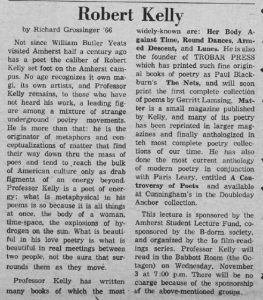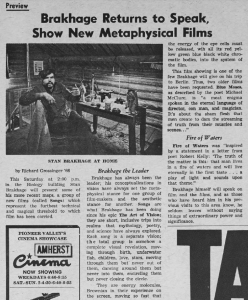Robert Kelly
Since 1961, Robert Kelly has been on the faculty at Bard College, New York. He currently serves as the Asher B. Edelman Professor of Literature and Co-Director of the Program in Written Arts. In 1961, he coined the term “Deep image” to refer to a new movement in modernist poetry, led by himself, Jerome Rothenberg, Diane Wakoski, and Clayton Eshleman.

Robert Kelly learned about Richard Grossinger through a copy of his Halloween introduction speech. At that ceremony, Charles Stein, Grossinger’s high-school friend, had brought along Harvey Bialy, who was then studying with Kelly at Bard College and who would play a major role throughout Io’s tenure. Impressed by the high-energy speech, Kelly invited Grossinger and Lindy Hough to his salon for further studies, which led to frequent trips to New York for more sessions throughout winter and spring. Kelly gave them reading lists for avant-garde literature and challenged the two of them to bring “radical consciousness” to the Pioneer Valley. Before the fraternity council demanded that Phi Psi create its own publication, Kelly had urged to Grossinger and Hough to start their own magazine. This suggestion, combined with the fraternity edict and the idea of a 4-college publication floated by Prof. Robert Bagg (UMass), came together in early 1965 to result in the creation of Io.
Robert Kelly remained Io’s primary mentor and has also made multiple visits to Phi Psi for poetry readings.
Stan Brakhage
Brakhage joined the ranks of experimental artists who visited Phi Psi, such as film-makers Kenneth Anger, Harry Smith, and Bruce Conner. These visits were sponsored by funds granted to Phi Psi by President

Calvin Plimpton. The poetry readings and film showings helped to make Phi Psi a hub for radical intellectual and creative activities, attracting students from the four colleges as well as many from the local area.
From Richard Grossinger on Brakhage’s metaphysical films:
Songs (Brakhage’s group of new films), are “short, inclusive trips into realms that mythology, poetry, and science have always explored”
“Each song is a separate vision; the total group is somehow a complete visual revelation, moving through birth, underwater fish, children, love, stars… but never closing the circle. ”
- Note the similarities between the spirit of these films and that of Io.
RETURN to Of Moons and Serendipity
Overview of Literary Magazines
Of Moons and Serendipity: the conception
Inside Io: mission statement, Io-1
Eyes on Io: the reception
Io after Amherst: post-Amherst transformation
Bibliography
Project by Phuong-Nghi Pham ’18